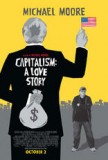| Reviews & Columns |
|
Reviews DVD TV on DVD Blu-ray 4K UHD International DVDs In Theaters Reviews by Studio Video Games Features Collector Series DVDs Easter Egg Database Interviews DVD Talk Radio Feature Articles Columns Anime Talk DVD Savant Horror DVDs The M.O.D. Squad Art House HD Talk Silent DVD
|
DVD Talk Forum |
|
|
| Resources |
|
DVD Price Search Customer Service #'s RCE Info Links |
|
Columns
|
|
|
Capitalism: A Love Story
Michael Moore may not be our most subtle filmmaker, and true to form, his new documentary/political treatise Capitalism: A Love Story is rather all over the place; while some other directors approach these kind of hot-button topics with the precision of laser beam, Moore prefers a shotgun approach, blasting his shrapnel onto whatever side topics wander into his field of vision. I note this as an admirer of his work; this more stream-of-consciousness style, perfected in 2002's Bowling for Columbine, fits the loose, rambling filmed-essay form he's adopted in that time, and if the transitions are a little wobbly on occasion, our interest seldom wavers.
Some of his tropes have grown a bit tiresome as well--his children's story-style narration has overstayed its welcome, and while they dig up some awfully good stock and educational footage, the opening interspersion of an historical film about the fall of ancient Rome with recent news footage is too heavy-handed, even for Moore. But once those early stumbles are cast aside and the divisive director gets down to business, he assembles his finest, and most effective, motion picture in years.
Since its explosion just over a year ago, the global and national financial crisis has fallen prey to mindless partisanship and the 24-hour news cycle; the path to disaster was such a ridiculously convoluted one that most people have arrived at answers and explanations that are just too easy. What Moore's film provides is some much-needed contextualization. He goes all the way back to the "good old days," to the comparatively debt-free and comfortable 1950s and 1960s, before bringing us up to the Carter and Reagan administrations (and the dangerous influence of Reagan's Treasury Secretary, Donald Regan). Clinton gets off a little easy (Glass-Steagall was repealed on his watch, after all), but Moore does get in some well-aimed parting shots at his old nemesis, George W. Bush.
Once the history has been filled in, the second act of the picture wanders a bit, though each of the detours is fascinating. We're told about the "PA Child Care" scandal, in which two judges were given kickbacks for sending kids, many of them minor offenders, for extended stays in a state-funded private juvenile facility. We're given some mighty scary information about how grossly underpaid airline pilots are. And, most disturbingly, there is an extended, shocking section on (often secret) life insurance policies taken out by corporations on their employees (called, crassly, "dead peasant" insurance).
These somewhat scattershot examples of reprehensible behavior motivated solely by greed leads to his stunning, but ultimately somewhat logical, thesis: that capitalism is a scam, a bill of goods that's been sold by the wealthiest 1% to the rest of us, a "plutonomy," as explicitly outlined in a series of leaked internal Citigroup memos from 2006. From there, he travels to the epicenter of American greed: Wall Street, where it takes a bit of work to come up with a plain-English explanation of how the housing crisis, and particularly the home loan implosion, happened.
This section of the film, an examination of the fall of the house of cards, is riveting, fierce, and angry ("What the fuck happened?" Moore asks one of his financial experts, pointedly). Simply put, it will make you furious. But the best is yet to come--the sequence dealing with the fall 2008 bailout (a move that Moore likens to rich banking interests "stealing the silverware on their way out" of the Bush White House) is thrilling, beautifully cut, and one of the finest pieces of work the filmmaker has put to celluloid. Breathlessly intercutting news footage, Congressional floor speeches, and virulent analysis, Moore calls that bailout a heist--and constructs the sequence accordingly. And then he builds it to a beautiful comic payoff, with a scene reminiscent of his unfortunately short-lived TV series The Awful Truth (I wouldn't have minded a cameo from our old friend Crackers, the Corporate Crime-Fighting Chicken).
The closing scenes find Moore at his most bitter and yet most hopeful, and amount to nothing less than a call to arms and a rally for revolution. And his final images (which have unfortunately been spoiled by some reviews and--bafflingly--Overture Films' own publicity photos) and voice-over are powerful and heartfelt. Capitalism: A Love Story is a long film (perhaps a few minutes too long), but it is rich and thoughtful, and--notably--isn't merely a partisan screed (as some of his other works have been, for better or worse). But it is a smart, funny, entertaining picture, and it couldn't be more timely. It's Moore at his best--rambling, undisciplined, and utterly brilliant.
Jason lives in New York. He holds an MA in Cultural Reporting and Criticism from NYU.
|
| Popular Reviews |
| Sponsored Links |
|
|
| Sponsored Links |
|
|
| Release List | Reviews | Shop | Newsletter | Forum | DVD Giveaways | Blu-Ray | Advertise |
|
Copyright 2024 DVDTalk.com All Rights Reserved. Legal Info, Privacy Policy, Terms of Use,
Manage Preferences,
Your Privacy Choices | |||||||











